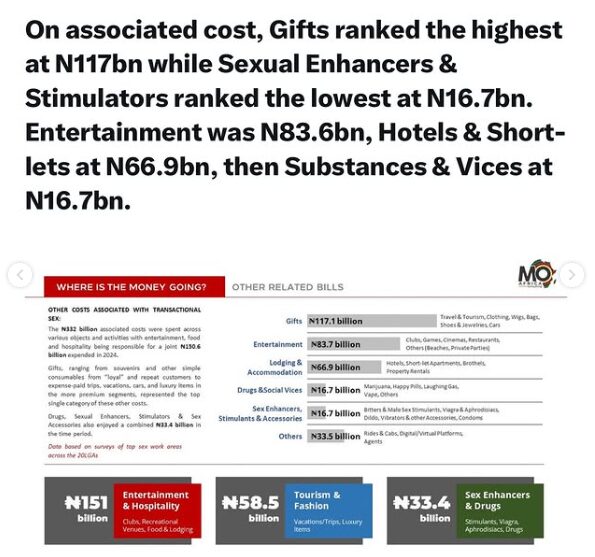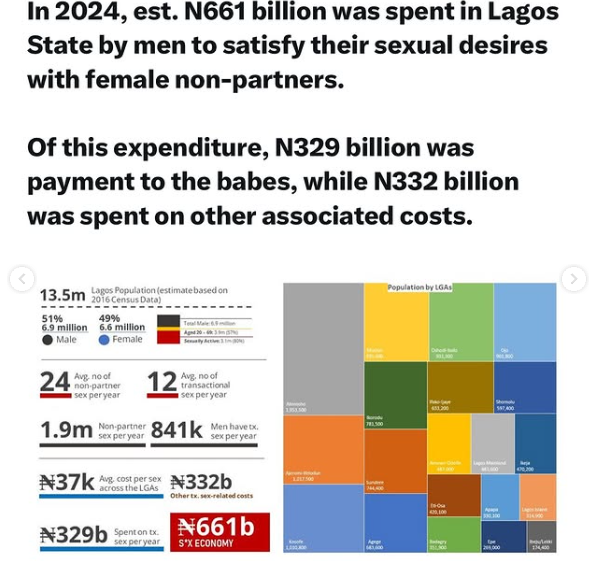Lagos Men Spent ₦661bn on Sex Workers in 2024 — Survey
Survey Overview
A recent survey disclosed that Lagos men expended a staggering ₦661 billion on sex workers during 2024. This revelation captured the attention of both local and national media.
The study was meticulously conducted and rigorously fact-checked by reputable experts. It sheds light on the vast economic dimensions of Lagos’ thriving sex industry. It also ignited debates on the social, economic, and moral implications of this spending. These findings invite a closer look at the hidden forces shaping urban consumer behavior in Nigeria’s commercial capital.
Methodology and Findings
The survey employed both quantitative and qualitative methods. It gauged spending patterns across diverse segments of the male population in Lagos. Participants from all socio-economic backgrounds shared candid insights into their personal expenditures. This provided researchers with an unprecedented glimpse into a largely unspoken aspect of urban life.
The data reveal that ₦661 billion resulted from consistent, high-value spending. It was not caused by isolated transactions. This impressive figure reflects broader trends in disposable income and shifting lifestyle choices.
Economic and Social Implications
The implications of this colossal expenditure extend far beyond economics. Observers note that the phenomenon reflects a complex interplay. It involves increasing urban affluence, modern consumer behavior, and the commercialization of intimate services.
The survey prompts questions about the balance between personal freedom and societal responsibility. It also raises concerns about public health, legal frameworks, and cultural values. In an urban setting marked by rapid modernization, convenience and discretion have redefined personal indulgence.
Urban Impact
In upscale areas like Victoria Island and Lekki, encounters with sex workers form an integral part of social life. These interactions are discreet and often occur in glittering clubs and exclusive lounges. Here, wealth, anonymity, and modern technology have given rise to an efficient network catering to high-demand clientele.
Conversely, in the densely populated neighborhoods of Lagos Mainland, spending is less overt but equally significant. This underlines the pervasive reach of the sex industry across all socio-economic groups.
Regulatory Debates and Ethical Dilemmas
The revelation of ₦661 billion has ignited a public debate. The discussion centers on the ethical and regulatory dimensions of the sex industry in Lagos. Policymakers and social commentators face the challenge of addressing a market that is economically significant yet operates in a legal and moral grey area.
Some experts argue that regulated oversight could protect industry workers and mitigate risks of exploitation and health hazards. Others worry that heavy-handed regulation might force the industry underground. Such measures could worsen issues like human trafficking and unmonitored economic activities. This dichotomy has sparked heated discourse among stakeholders. Both government officials and community advocates call for a measured yet proactive approach.
Economic Impact and Industry Insights
Economically, ₦661 billion signifies a robust infusion of capital into an industry on the fringes of the formal economy. Industry insiders suggest that this spending shows the presence of a clientele with considerable disposable income. This clientele supports a vast and intricate network of service providers.
Although largely informal, this activity can stimulate sectors such as hospitality, transportation, and security. It indirectly contributes to the broader urban economy. While the financial benefits are clear, the social costs remain debatable. Public health risks and the erosion of cultural norms continue to concern many.
Cultural Shifts and Public Discourse
The findings spotlight a contentious cultural issue. They highlight the transformation of traditional values amid modern urbanity. Critics say this spending departs from Nigeria’s conservative ethos. They argue that it undermines familial relationships and erodes societal morals.
In contrast, proponents of personal freedom argue that these expenditures reflect the complexities of modern relationships. Individuals seek satisfaction and connection in a dynamic urban setting. This clash of views has polarized public opinion. Both sides now reexamine their assumptions about morality, freedom, and economic opportunity.
Key Drivers Behind the Surge
Analysts have identified key factors behind the surge in expenditure. Urban stress, the fast pace of city life, and a desire for escapism drive the increased patronage of sex workers. Lagos offers anonymity and relative impunity. Men engage in these transactions with little fear of social reprisal.
This mix of factors has cultivated an environment where the sex industry flourishes. A sophisticated network uses modern technology to facilitate discreet interactions.
Future Trends and Collaborative Approaches
Looking ahead, experts predict that these trends will continue. Rising disposable incomes, technological advancements, and evolving social attitudes may propel the industry to even greater heights. Stakeholders in law enforcement, public health, and community advocacy are urged to collaborate. They must address the multifaceted challenges of this burgeoning market.
The focus keyphrase “Lagos sex worker expenditure 2024” resonates in policy forums and academic circles. The survey is expected to spark further research and dialogue.
Human Stories and Visual Evidence
The findings compel a reassessment of the broader impact on Lagos’s social fabric. Behind the figure lies a complex tapestry of human experiences that defy simplistic explanations. Many sex workers share stories of resilience, hardship, and a struggle for dignity. They work in a field fraught with stigma and legal uncertainties. Their narratives add a human dimension to an otherwise economic statistic, revealing themes of survival and empowerment.
Images of vibrant Lagos nightlife and busy streets offer visual context. A striking image titled “Lagos Survey Data” shows a crowded street lit by neon lights. It symbolizes the hidden economic forces at work. A video titled “Inside Lagos: The Hidden Economy” provides an in-depth look at the sex industry’s impact. It features interviews with local experts and firsthand accounts.
Urban Contradictions and Policy Reflections
In Lagos, a city renowned for its energy, the revelations represent more than a financial statistic. They encapsulate modern contradictions. Traditional values clash with contemporary urban living. The ₦661 billion spent in 2024 is a testament to Lagos’s transformation. It challenges established norms while opening new avenues for economic and social engagement.
The survey serves as a powerful reminder of urbanization’s impact on personal behavior and social norms. The ₦661 billion figure is astonishing, reflecting a broader shift in economic power in modern Nigeria.
As Lagos evolves into a metropolis blending tradition with modernity, stakeholders must engage in dialogue. Economic progress must be harmonized with social integrity. This report’s revelations demand honest conversations about these challenges and opportunities.



